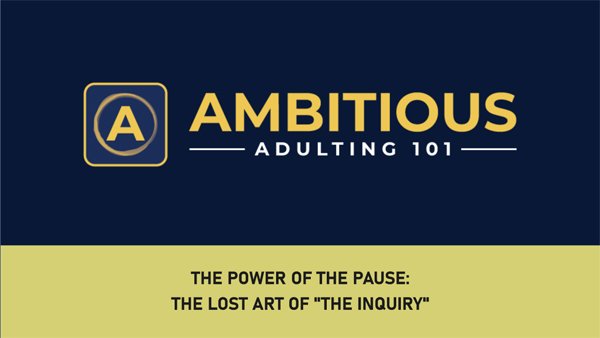Inquiry (in·quir·y /ˈinˌkwīrē,inˈkwīrē,ˈinkwərē) noun
plural noun: inquiries
- an act of asking for information.
- an official investigation
We’ve lost the ability to slow down and consider.
That might be an overstatement, but one of the most overlooked skill sets I see in people is the ability to ask good questions and sit with uncomfortable answers.
Fact: More often than not, deep questions lead to better results.
Perhaps you’ve heard the old quote, “The better the question, the better the answer.” This means that the quality of our answers (in other words – how we act out our lives.) is directly dependent on the quality of the questions we ask ourselves.
I think we’ve become so uncomfortable with difficult answers and things we don’t understand that we search for “quick fixes” and “first answers,” often shortcutting deep thinking due to the emotional and mental weight they require.
In virtually any breakdown (collapse of function) — whether it’s a business deal, a project at work, or even a personal issue—there’s a natural desire to jump straight to solutions.
But what if the key to better outcomes isn’t acting quickly, but rather taking a step back to deeply inquire into what’s really going on?
At the heart of effective assessment is something we teach at Influential U (and that I have written on a sticky note on my desk): the power of John Dewey’s Pattern of Inquiry. Dewey teaches us to (1) pause and consider the problem thoroughly; (2) identify it; (3) gather evidence; (4) test ideas; and finally, (5) draw conclusions.
This process doesn’t just validate our actions; it strengthens our ability to adapt, reflect, and refine, ensuring our transactions are always on track.
In my experience, the “Assess” phase of the Transaction Cycle isn’t about scrutinizing every minor misstep—it’s about using inquiry to gain insights and drive continuous improvement.
By validating or modifying our approaches based on outcomes and feedback, we create a powerful loop of learning.
This loop builds resilience, adaptability, and, ultimately, success.

If John Dewey seems too old-school and you prefer newer teachers… (::shrug::) Here’s a reminder from Brené Brown: “Problem identification is always a sound investment of time, money, and energy.”
She echoes Albert Einstein’s wisdom: it’s more valuable to spend 55 minutes thinking about the problem and only 5 minutes on solutions.
Sure, it’s uncomfortable to think this long. (Most people won’t do it and there are many times in which some people inquire far too long before taking action…)
But slowing down to diagnose and clarify before rushing in is what sets apart those who succeed from those who repeat the same mistakes.
What do we do with this info?
When you’re in the thick of a challenge, resist the urge to lean into “immediate-action” bias.
Instead, invest time in thoughtful inquiry—it’s the most strategic move you can make. Let’s cultivate a culture where assessment and inquiry aren’t afterthoughts but essential steps toward real, sustainable progress.
My daily mantra for this is: “Not everything needs an immediate resolution.”It reminds me to slow down to speed up.
My point: don’t race to fix discomfort.
Embrace the inquiry. (Nobody else seems to be doing it, and it’ll immediately make you a more valuable thinker.)
There’s a power in the pause that is “the inquiry”.
Use it.
#Leadership #Assessment #Inquiry #ContinuousImprovement

